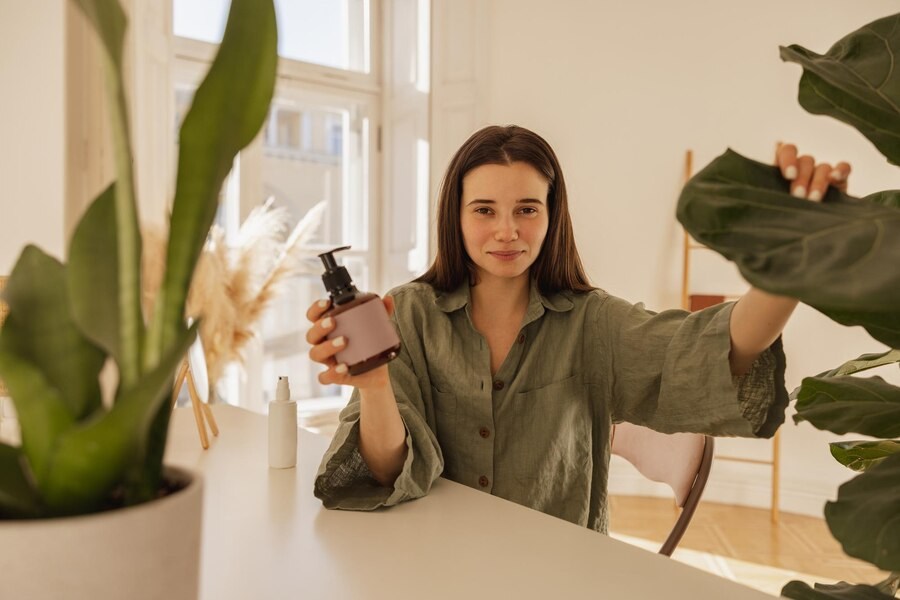Hair scalp treatment is a cornerstone in maintaining a healthy head of hair. Utilizing essential oils in your routine can transform your scalp and hair look and feel. These natural remedies have been used for centuries to address various hair and scalp issues, and their popularity continues to grow in modern times.
Understanding the Basics of Scalp Health
It is a complex ecosystem that requires proper care and attention to function optimally. A healthy scalp is well-nourished, hydrated, and free from irritation, allowing hair follicles to thrive and produce strong, lustrous locks.
Several factors can impact scalp health, including:
- Genetics
- Hormonal changes
- Environmental stressors
- Diet and nutrition
- Hair care practices
When the scalp is neglected or exposed to harsh treatments, it can lead to various issues such as dryness, flakiness, itchiness, and even hair loss. By incorporating essential oils into your hair care regimen, you can nourish and protect your scalp, promoting a healthy environment for hair growth.
For more insights on hair scalp treatment, check out our detailed guide to enhancing your hair care routine. This resource covers everything from identifying your scalp type to creating a personalized treatment plan that delivers results.
Top Essential Oils for Scalp Treatment
They can help balance scalp moisture, reduce inflammation, and stimulate hair follicles for improved growth when used correctly. Here are five essential oils that have proven particularly effective for scalp treatment:
Tea Tree Oil: The Antifungal Champion
Tea tree oil, extracted from the leaves of the Melaleuca alternifolia tree, is well-known for its strong antifungal and antibacterial effects. It is an excellent choice for combating common scalp issues like dandruff, seborrheic dermatitis, and fungal infections.
A 2002 study published in the Journal of the American Academy of Dermatology found that a shampoo containing 5% tea tree oil effectively treated dandruff, reducing scalp flakiness, itchiness, and greasiness. Incorporating tea tree oil into your scalp treatment routine can help keep your scalp clean, balanced, and free from irritation.
To use tea tree oil for scalp treatment:
- Mix 2-3 drops of tea tree oil with a tablespoon of carrier oil like coconut or jojoba oil.
- Massage the mixture onto your scalp, focusing on the problem areas.
- Allow it to sit for a minimum of 30 minutes, or leave it overnight for optimal absorption.
- Rinse thoroughly with lukewarm water, then proceed with your usual shampoo and conditioner routine.
Lavender Oil: Soothing and Healing
Lavender oil, obtained from the flowers of the Lavandula angustifolia plant, is highly regarded for its soothing and therapeutic benefits. When applied to the scalp, it can help soothe inflammation, reduce stress, and promote relaxation.
In addition to its calming effects, lavender oil has been shown to stimulate hair growth. A 2016 study published in the journal Toxicological Research found that lavender oil significantly increased the number of hair follicles in female mice, suggesting its potential as a natural hair growth promoter.
To incorporate lavender oil into your scalp treatment routine:
- Add 2-3 drops of lavender oil to a tablespoon of warm carrier oil.
- Gently massage the mixture into your scalp, using circular motions to stimulate blood flow.
- Allow the oil to penetrate for at least 30 minutes, or leave it on overnight for deeper nourishment.
- Wash your hair as usual, using a gentle shampoo and conditioner.
Peppermint Oil: Stimulating Hair Growth
Peppermint oil, derived from the leaves of the Mentha piperita plant, is known for its invigorating and refreshing properties. Applying it to the scalp creates a cool, tingling sensation that can help stimulate blood circulation and awaken hair follicles.
A 2014 study published in Toxicological Research found that peppermint oil significantly increased hair growth in mice compared to a control group. The researchers attributed this effect to the oil’s ability to dilate blood vessels and increase follicular depth.
To use peppermint oil for scalp stimulation:
- Mix 2-3 drops of peppermint oil with a tablespoon of carrier oil.
- Massage the mixture into your scalp, focusing on sparse hair growth areas.
- Leave the oil on for 20-30 minutes, allowing it to penetrate deeply.
Rosemary Oil: Fortifying Hair Follicles
Rosemary oil, extracted from the leaves of the Rosmarinus officinalis plant, has long been used in traditional medicine to promote hair health and growth. This potent essential oil is rich in antioxidants and anti-inflammatory compounds that can help protect and strengthen hair follicles.
A 2015 study published in SKINmed found that rosemary oil was as effective as minoxidil, a popular hair growth medication, in treating androgenetic alopecia (male and female pattern baldness). After six months of treatment, participants who used rosemary oil experienced significant increases in hair count and thickness.
To use rosemary oil for scalp fortification:
- Combine 2-3 drops of rosemary oil with a tablespoon of carrier oil.
- Massage the mixture into your scalp, focusing on areas where hair is thinning or weak.
- Allow the oil to absorb for at least 30 minutes, or leave it on overnight for maximum benefits.
- Wash your hair as usual, using a nourishing shampoo and conditioner.
Argan Oil: The Moisture Miracle
Argan oil, sourced from the kernels of the Argania spinosa tree, is frequently referred to as “liquid gold” because of its rich, golden hue and luxurious feel. This non-essential oil contains fatty acids, vitamin E, and antioxidants that moisturize and nourish the scalp and hair.
Argan oil can help combat scalp dryness, flakiness, and irritation by regulating sebum production and providing essential nutrients. It also smoothens the hair cuticle, reducing frizz and promoting a glossy, healthy appearance.
To incorporate argan oil into your scalp treatment routine:
- Warm a few drops of pure argan oil between your palms.
- Massage the oil directly into your scalp using gentle, circular motions.
- Work the remaining oil through your hair, focusing on the ends.
- Shampoo and condition your hair as normal, rinsing thoroughly to remove excess oil.
How to Apply These Oils for Optimal Benefits
To maximize the effectiveness of your essential oil scalp treatment, it’s important to follow proper application techniques. Here are some general guidelines to keep in mind:
- Always dilute essential oils with a carrier oil before applying to the scalp. This helps prevent skin irritation and ensures even distribution of the active ingredients.
- Before using any new essential oil, perform a patch test to check for allergic reactions or sensitivities.
- Leave the oil on for at least 30 minutes or overnight for deeper nourishment.
- Rinse the oil thoroughly with lukewarm water and follow up with your regular shampoo and conditioner routine.
Consistency is key in seeing results from essential oil scalp treatments. Aim to incorporate these treatments into your hair care routine at least once or twice a week, adjusting the frequency based on your scalp’s needs.
Conclusion
Essential oils offer a natural, effective way to care for your scalp and promote healthy hair growth. You can nourish your scalp, reduce inflammation, and create an optimal environment for your hair to thrive by harnessing the power of tea trees, lavender, peppermint, rosemary, and argan oils.
Remember, consistency and patience are the keys to success with essential oil scalp treatments. Start by incorporating these oils into your routine a few times a week, and be sure to dilute them properly with a carrier oil to prevent irritation.
As with any new hair care regimen, listening to your scalp and adjusting your approach as needed is essential. If you experience any adverse reactions or are concerned about using essential oils, consult a dermatologist or hair care professional for personalized guidance.
By prioritizing scalp health and the natural healing properties of essential oils, you can achieve the lustrous, healthy hair you’ve always dreamed of. So indulge in self-care, and give your scalp the love and attention it deserves. Your hair will thank you for it.
FAQs
Q: Can these oils be used daily?
A: While these oils are generally safe, it’s best to use them a few times a week to avoid overwhelming your scalp, especially if you have sensitive skin. Overuse of essential oils can lead to irritation or imbalances in scalp moisture. Start with once or twice weekly treatments and adjust the frequency based on your scalp’s response.
Q: Are there any side effects?
A: Side effects are minimal if used properly and in the right dilution. However, some people may experience allergic reactions or sensitivities to certain essential oils. Always perform a patch test on a small skin area before applying new oil to your scalp. If you notice redness, itching, or swelling, discontinue use immediately and consult with a healthcare professional.
Q: How long before I see results?
A: The timeline for seeing results from essential oil scalp treatments varies depending on your hair and scalp condition. Some people may notice improvements in scalp health and hair appearance within a few weeks of consistent use, while others may require several months to see significant changes. Be patient and consistent with your treatments, and trust that your scalp is benefiting from the nourishment and care you’re providing.
Q: Can I mix different essential oils for my scalp treatment?
A: You can create your essential oil blends for scalp treatment. Combining oils with complementary properties can enhance their effectiveness and provide a more comprehensive approach to scalp care. For example, mix tea tree oil with lavender oil to balance scalp moisture while promoting relaxation. Just be sure to keep the total concentration of essential oils to a safe level (usually around 2-3% of the total mixture) to avoid irritation.
Q: How do I choose the right carrier oil for my essential oil scalp treatment?
A: The choice of carrier oil depends on your scalp’s specific needs and personal preferences. Some popular options include:
- Coconut oil: Deeply moisturizing and rich in fatty acids that nourish the scalp and hair.
- Jojoba oil: Similar in composition to the scalp’s natural oils, it is an excellent choice for balancing sebum production.
- Almond oil: Lightweight and easily absorbed, perfect for those with fine or oily hair.
- Avocado oil: Rich in vitamins and minerals that promote scalp health and hair strength, ideal for dry or damaged hair.
Experiment with carrier oils to find the best one for your scalp and hair type. Mix and match oils to create a personalized blend that addresses your concerns.
Q: Can I use essential oils on color-treated or chemically processed-hair?
A: Essential oils can be used on color-treated or chemically processed hair. These natural remedies can help nourish and protect your hair from the damaging effects of chemical treatments. However, choosing gentle, non-irritating oils and diluting them properly is essential to avoid further stress on your hair. Argan oil and lavender oil are particularly well-suited for color-treated or chemically processed hair, as they provide deep moisture and help soothe the scalp.
Q: How should I store my essential oils to maintain their potency?
A: Proper storage is key to preserving the quality and effectiveness of your essential oils. Follow these guidelines to ensure your oils remain potent and safe to use:
- Keep oils in original glass containers with tight-fitting lids to prevent oxidation and contamination.
- Avoid storing essential oils in plastic containers, as the oils can break down the plastic over time.
- Label your oils clearly with the name and date of purchase to keep track of their age and potency.
- Use oils within 1-2 years of opening for maximum effectiveness, as their therapeutic properties can diminish over time.
Following these simple storage guidelines ensures that your essential oils remain a powerful and reliable tool in your scalp care arsenal.


Great job on this article! Learned something new and useful.